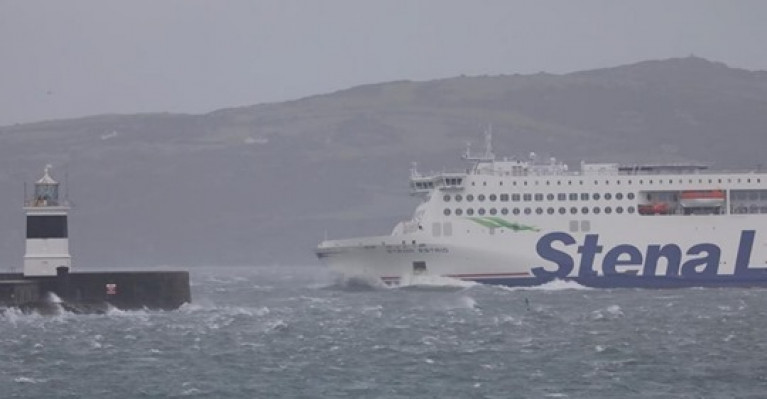Displaying items by tag: Storm Eunice
Ferries & Flights Cancelled as Storm Eunice Moves Across Ireland
Several ferry crossings and flights have been cancelled as Storm Eunice tracks across Ireland.
Gusts of more than 130km/h have been reported in some areas, and thousands of homes and businesses have been left without power.
(For more on coverage of flights see also the RTE News report)
A number of ferry sailings to the UK, France and Spain from Rosslare have also been cancelled. All intending ferry and air passengers are advised to check what is going ahead with whoever they are booked with.
ESB Networks has said that 80,000 customers are now without power nationally.
In addition to read more on the weather situation nationwide click here.
Dublin Port Closes Wall Access As Storm Eunice Warnings Upgraded
Dublin Port Company will temporarily close access to both the Great South Wall and the Bull Wall bridge tomorrow (Friday 18 February) due to the arrival of Storm Eunice.
The Great South Wall wall be closed from midnight tonight until 7am on Saturday, while bridge access to the Bull Wall will be closed from 10am to 4pm tomorrow.
These times will be subject to review and adjustment as necessary over the next 24 hours, the port company says.
Meanwhile, Met Éireann has upgraded its warnings for Storm Eunice as it tracks inland this evening.
A Status Red storm warning is now in place from Howth Head to Roches Point to Erris Head and on the Irish Sea south of Anglesey, as cyclonic variable winds veering northwesterly will reach storm force 10 or violent storm force 11 at times overnight and tomorrow morning.
There will also be a risk of coastal flooding, especially at high tide, in counties Clare, Kerry, Cork and Waterford.
RNLI Offers Coastal Safety Advice Ahead of Back-to-Back Storm Warnings
With both Met Éireann and the UK’s Met Office predicting disruptive weather this week due to back-to-back storms, the RNLI has urged the public to be careful at the coast.
The charity that saves lives at sea is encouraging people to exercise extreme caution if visiting the shoreline, especially along exposed cliffs, seafronts and piers with winds expected to hit 145kmh.
Storm Dudley is due to affect Ireland, Scotland, Northern Ireland and parts of northern England tomorrow afternoon (Wednesday 16 February), with Storm Eunice close behind and bringing a weather warning for most of Ireland and the UK on Friday.
RNLI national water safety partner Samantha Hughes said: “The expected storms could make our seas treacherous, increasing the risk for those visiting the coast around the UK and Ireland.
“In a normal year around, 150 people lose their lives at the coast and we know that more than half of those never intended to be in the water. So, whether you are walking, running or cycling at the coast, please be extra responsible and avoid taking unnecessary risk or entering the water.
“In particular, we ask people to stay well back from stormy, wintery seas and cliff edges, check tide times before you go, take a phone with you, and call 999 or 112 and ask for the coastguard if you or someone else is in trouble.”
Met Éireann meteorologist Liz Coleman said: “Whilst Wednesday will be a windy and gusty day everywhere, the winds will be especially strong in hilly areas and along exposed coasts where we could have gusts reaching 80-110kmh at times. The strong winds in combination with high tides could lead to large coastal waves and some coastal flooding in parts of the west and northwest.”
She added: “Storm Eunice will quickly develop in the Atlantic on Thursday and arrive on our shores on Thursday evening. This system will bring strong winds, spells of heavy rain and snow on Thursday night, leading to multiple hazards and the potential for damage and disruption to travel, especially on Friday morning.
“A Weather Advisory is in place for Thursday night and Friday and current indications suggest the strongest winds are likely to be across the southern half of the country, with the most significant snowfalls over central and northern parts of the country. Further heavy rainfall may lead to river and spot flooding in parts of the north west. Weather warnings are likely to be issued in the coming day, so we’re advising people to keep a close eye on the forecast and warnings.”
A Small Craft warning is in place from this evening (Tuesday 15 February) for all coasts of Ireland, with westerly winds reaching Force 6.
In addition, a Status Yellow gale warning is in place from Valentia to Erris Head to Fair Head as west to southwest winds are forecast to reach Force 8 this evening and Force 9 overnight. The warning extends to all coasts of Ireland and the Irish Sea from tomorrow morning.
The RNLI’s key water safety advice is:
- Take care if walking near cliffs – be aware of ice and frost, know your route and keep dogs on a lead.
- Check weather forecasts and tide times daily.
- Take a fully charged phone.
- Check your equipment is in good working order.
- Be aware of the conditions and your capabilities.
- In an emergency call 999 or 112 and ask for the coastguard.
























































